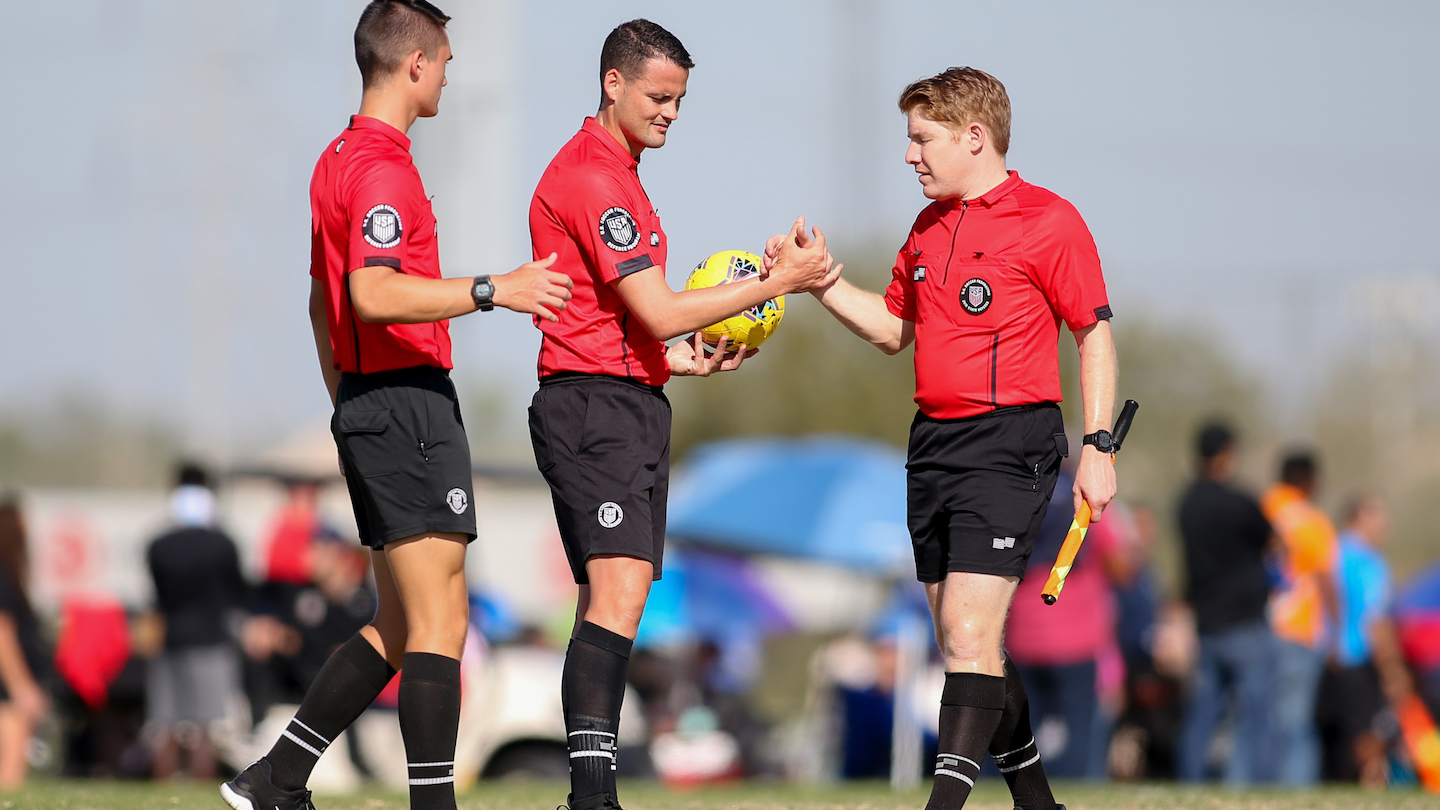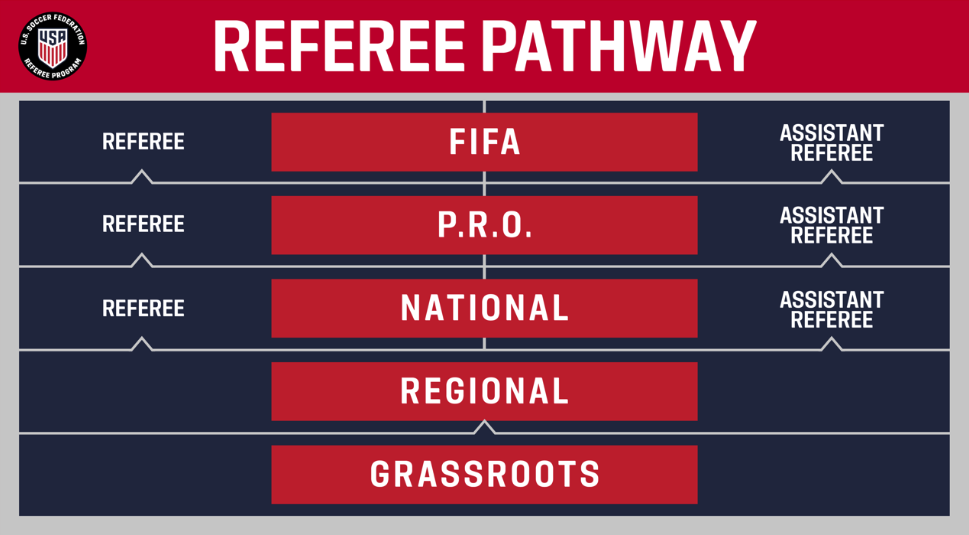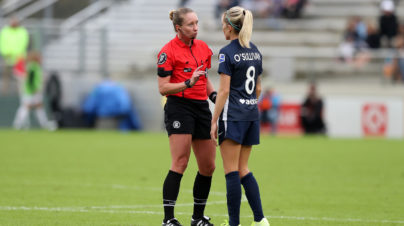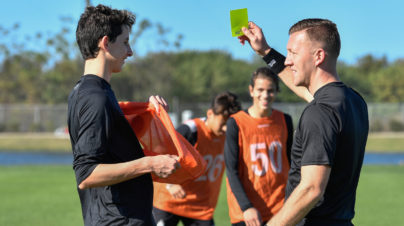How Anyone Can Become a Certified U.S. Soccer Referee

By Adam Schwager
SoccerWire Staff Writer and Certified Referee
Spring is finally here and with that more and more teams across the country are starting their seasons of the beautiful game. While there are many ways to be involved with the game, I believe almost everyone heavily involved in youth soccer should step foot in a referee certification class at some point in their careers.
Whether you’re a former player or current parent looking for ways to get more involved in the game, or a current coach or player looking to gather more insight on how a referee operates during the course of a game, taking the time to get your license will be worth it. You don’t even have to be done with your playing days either, U.S. Soccer allows anyone 13 and up to get certified as a Grassroots Referee.
One of the largest hurdles for any aspiring referee is finding the resources to get registered and find those in-person classes. Each state referee association (there are 56) has a separate process to get signed up, and many of them are on archaic and confusing websites that sometimes leave more questions than answers.
Additionally, some state associations have already finished training new referees for the 2021 season, but for those who missed their chance, most certification programs for the 2022 season will be open by the end of the summer.
Here is our guide on how to become a U.S. Soccer Referee:
Universal Requirements
While every state association has slightly different variations on how to become a referee, U.S. Soccer recently started to standardize many of the requirements to become a new referee. U.S. Soccer now runs their own nationwide online portion of the referee certification process, through their U.S. Soccer Learning Center. Not every state uses the U.S. Soccer Learning Center for registration, but if they do, you will have to complete each of the following steps before your in-person referee certification session.
If your state is listed below as using the U.S. Soccer Learning Center, you can most likely find a referee course by using this list. Once registered, aspiring referees will complete at least two modules entitled “Introduction to Safe and Healthy Playing Environments” and “Online Grassroots Referee Course Module.” In total, these two modules take approximately 4.5 hours, but can be split up over multiple sessions as your progress will be saved for you. All referees will then have to take an online grassroots quiz that takes around to 45 minutes to complete, before going to their in-person training course.
[+READ: Five Reasons Why You Should Become a Youth Soccer Referee]
Aspiring referees 18 and older must also complete the hour-long SafeSport clinic, a fairly new governmentally-required training designed to help all officials involved in youth sports identify and report abusive behaviors to help keep our young athletes safe. Along with the extra one hour module, all aspiring referees over the age of 18 must complete a U.S. Soccer Federation Gold Standard NCSI Background Check before receiving their certifications. If your state is using the U.S. Soccer Learning Center, click here to create your U.S. Soccer Referee Learning Center profile to register for a class.
Frequently Asked Questions (FAQ)
Q: How old do I need to be to become a certified referee?
A: The minimum age to referee games in the United States is 13 years old, although many states differ based on local labor laws. If not otherwise noted in your state’s referee process, assume the age requirement is 13.
Q: How do I get assignments after completing the course?
A: The primary way to get games is to work through a referee assignor. Assignors generally create partnerships with certain clubs, leagues or tournaments to act as the middleman between the organizations and the referees. Learning how to connect with assignors is generally a massive part of the in-person instruction in Grassroots referee courses, so make sure to pay full attention because without help from assignors, your certification will go to waste.
Q: How much money can I earn?
A: The amount you can earn varies depending on a multitude of factors, including the age of the players you are refereeing, the area in the country in which you plan to officiate and what type of event you are officiating. For example, league games tend to pay more per game, but have longer game lengths while tournaments generally pay less on a per game basis, but have truncated game lengths that allow referees to work more in a given day.
While this shouldn’t be treated as gospel, a good rule of thumb for youth games is that for every minute of game length, an assistant referee makes about $0.50, while a center referee makes around $0.70-$1.00. That would mean in a standard 90-minute game each assistant would make $45 while the center would make $63-$90.
SOCCERWIRE MARKETPLACE
- The St. James FC Virginia 2024-2025 Travel Tryouts
- TSJFCV - Hiring Travel Soccer Coaches
- Hiring: U13-U19 Boys Director
- Coaches Needed
- Train with professional AC Milan coach
- Loudoun Soccer 2024/25 Travel Player Placement Sessions
- Official Elite Summer Soccer Camps with Elite Pro Clubs in Europe
- Official EPL Tickets: ARSENAL, LIVERPOOL, TOTTENHAM & MORE
- Travel to Denmark for Dana Cup Hjørring 2024
- New England Surf Challenge and Showcase 2024


















